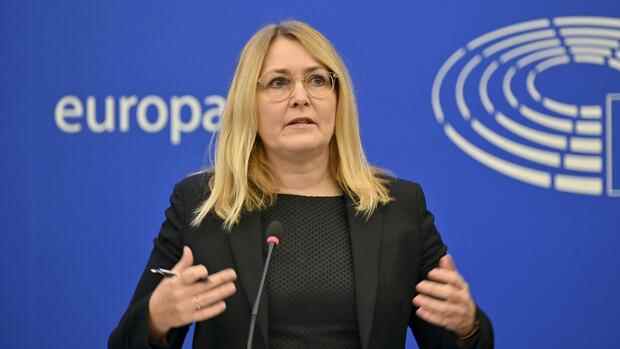The Danish social democrat Christel Schaldemose is responsible for the Digital Services Act in the European Parliament.
(Photo: action press)
Brussels The European Parliament wants to adopt its position on the Digital Services Act (DSA) in January. Negotiations can then begin with the member states on the law, which is intended to intervene deeply in the functioning of social networks. It should come into force in 2023 at the latest.
The DSA is the European answer to the finding that false reports spread faster on the Internet than they are corrected and that hatred is building up in the comment areas.
The law does not prohibit any statements, so it does not interfere with freedom of expression. Defining their limits remains the task of the member states.
Instead, EU law creates transparency about how recommendations are made. This should allow users to see why certain posts are being displayed to them. This can be, for example, previously viewed content or assumptions made by the platform about the interests of the user.
Top jobs of the day
Find the best jobs now and
be notified by email.
The platforms collect large amounts of data about each of their users and assign them keywords. These keywords determine which content other users are shown to them and which advertising is shown.
In the future, the platforms will display the keywords and give users the opportunity to intervene. It should also be possible to display content in strict chronological order, i.e. not according to a weighting by an algorithm.
“We do not censor legal content, but force the platforms to reveal their mechanisms,” says the Green MEP Alexandra Geese. “That will stop hatred and agitation more than arbitrary deletions.”
Evidence of the fake news reinforcement
A look into the algorithms should also help stop fake news. Researchers have observed that these hoaxes are often displayed more prominently than real news. This is probably due to the fact that fake news evoke more emotions and therefore more likely to lead to user interaction.
“It is obvious that misinformation is preferred by the Facebook algorithms,” says Geese. “The DSA gives scientists the opportunity to research this and develop systematic solutions that protect freedom of expression.”
“We don’t censor legal content, we force the platforms to reveal their mechanisms.”
(Photo: Bündnis 90 Die Grünen)
So far, the recommendation algorithms are considered trade secrets. For years they have played a decisive role in worrying social developments. Right-wing extremists around the world benefit from disinformation and conspiracy theories.
The EU sees itself as a pioneer in the regulation of Internet platforms and has received confirmation from Facebook whistleblower Frances Haugen.
She said at a hearing in November that the DSA could become the “global gold standard” when it comes to protecting democracies through new rules. The prerequisite is that the rules are enforced vigorously and that there are not too many exceptions.
The enormous damage caused by social media
Haugen had previously revealed that the meta group is very aware of the dangers posed by its Facebook and Instagram platforms, but often does nothing to limit the danger. These include depression among teenagers who consume contributions from influencers and the persecution of the Rohingya ethnic group in Myanmar.
The Facebook whistleblower supports MEPs in creating new rules.
(Photo: AP)
In the USA, since the storming of the Capitol in early 2021, efforts have been made to bring more transparency to the way social media platforms work. There has been a draft law since May, but the chances of success are rather slim. A bill in the UK targets specific content rather than how the algorithms work.
The DSA has been available as a draft since the end of 2020. The legislative process has so far been astonishingly quick, even if it is not up to the speed with which China is now proceeding. The Council of EU Member States determined its position in November, the European Parliament will only negotiate the final details in January. Then the “trialogue” begins, in which the Council, Parliament and the Commission have to find compromises.
One of the disputes is whether minors may be shown personalized advertising. In addition, the Council and Parliament will argue about the cases in which the new rules are monitored by the EU and in which cases by the Member States.
More: “New regulatory territory”: China regulates algorithms with a new law
